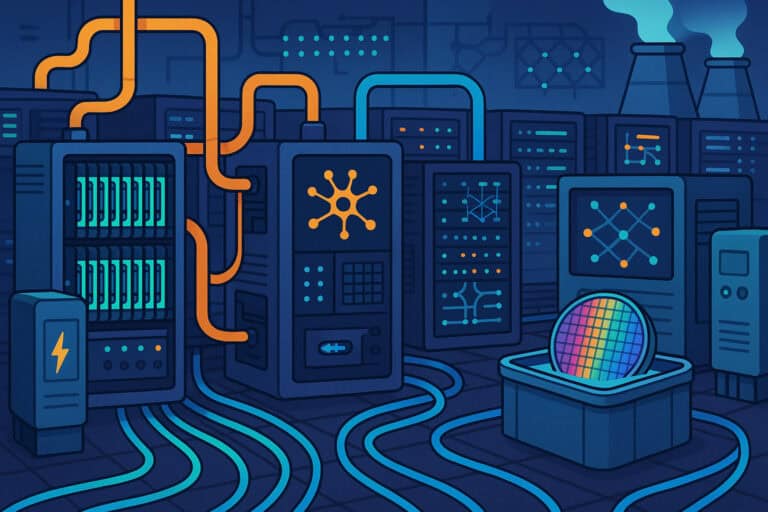Private and sovereign AI developed in the Netherlands requires storage that can meet the strict requirements set by Nebul and legislation.
AI needs access to data to be effective. This is often sensitive data that organizations are unwilling and unable to store just anywhere. Private AI and sovereign AI are therefore becoming increasingly important. Serial entrepreneur Arnold Juffer, CEO of the Dutch company Nebul, saw this coming years ago (long before ChatGPT became available) and got to work.
The result of Juffer and Nebul’s efforts is a PaaS that aims to enable organizations to seamlessly use AI in combination with their own environment. The emphasis is primarily on inference, rather than training. Nebul chose NetApp for its storage needs. We spoke with Juffer and Pascal de Wild, Senior Solutions Engineer at NetApp, about this collaboration, among other things.
Nebul is a special neocloud
The question that Juffer and his team asked themselves before Nebul finally saw the light of day was clear. In Juffer’s words: “How do you make private clouds performant and compliant?” Public clouds are primarily built for convenience, not so much for the best performance, while HPC environments are extremely powerful, but very much tailored to the workloads they run. In between, Juffer saw room for what is now Nebul.
An interesting detail in Juffer’s background, and therefore also in Nebul’s, is that he has always been involved in high-performance infrastructure. This ranged from pure hardware, through software-defined to a cloud model, but the basis always remained HPC. This makes Nebul a special neocloud. Many other neoclouds (of which CoreWeave is the best known) have their origins in crypto.
Nebul has partnerships with Dutch data center players such as Eurofiber, NorthC Datacenters, and Switch Datacenters. From there, the company provides platform services to customers.
The challenge of hosting AI inferencing
As mentioned above, Nebul is primarily concerned with offering an AI platform for inferencing. Nebul’s own cloud runs on this PaaS environment, but customers can also use it. In addition, Nebul also offers Model-as-a-Service, which allows customers to run Deepseek independently, for example. And there is an RAG model available, so customers no longer have to do this themselves. This is known as AI Studio Search.
Such an environment is completely different in many ways from building an infrastructure for training AI models. If we look at supercomputers used to train AI models, these are highly specialized single-tenant systems. If you want to offer inferencing, it has to be multi-tenant. The inferencing market consists of many smaller customers, all of whom you want to be able to serve from a single environment.
Not only is such an environment built differently, but it also has different requirements in terms of security, customer isolation, and existing infrastructure at customers’ sites. Only when this is optimally configured can Nebul offer scalable and sovereign Private AI in a single instance that runs exclusively for a single customer.
The role of NetApp
This brings us to the role that NetApp plays in building the sovereign AI cloud that Nebul is bringing to market. In 2024, Nebul chose the AFF-A90 for storage. The A90 is one of the top models in the series, which was marketed specifically for the purposes Nebul has in mind, including AI inferencing and RAG.
NetApp’s focus on AI with the AFF-A90 (actually the entire AFF series) is not just a marketing slogan. With this line, NetApp can meet the requirements that a party such as Nebul places on the storage layer. The performance is excellent and (more importantly) NetApp has multi-tenancy down to a tee. In fact, Nebul tested multiple providers and the combination of the performance they were looking for and the multi-tenancy they required “we only managed to achieve with NetApp,” says Juffer.
Piggybacking on NetApp’s scale
Finally, it is also worth mentioning that NetApp has a large installed base with more than 30 years of experience and customers in the enterprise market. This is a major advantage, particularly in more regulated environments such as government, healthcare, and biotech, which are typically looking for sovereign solutions. Compliance requirements are high in these sectors, and NetApp is able to meet them. NetApp has all the same certifications in the areas of sovereignty and security that Nebul has. So, in this respect too, the two parties are a good match.
Nebul can therefore make good use of NetApp’s scale. Initially, this mainly involves being able to tell the story. “We do suffer from a lack of understanding in the market,” says Juffer. In other words, knowledge of (generative) AI is fairly low. People are familiar with ChatGPT, but that’s about it. The idea is that if Nebul can raise awareness a little more here and there through NetApp’s reach, it will be positive for everyone.
Don’t wait for an AI factory
Nebul shows that, thanks in part to the use of NetApp systems and software, it is already perfectly possible to use a platform for (among other things) AI inferencing and RAG in a fairly accessible way. Organizations that are still waiting to see what their government will do around the construction of AI factories (not a good idea, in our opinion, but that aside) could also take a look at Nebul’s platform. There, you already have an AI factory at your disposal.
Nebul is leading the way with the offering it has developed, with an emphasis on compliance. That is certainly a bold move. It is also a necessary move if we want to enable organizations in the Netherlands to really start using AI inferencing. It won’t take off immediately; for that to happen, there simply needs to be more knowledge in the market. However, the beginning is there. With the opportunities that NetApp offers Nebul, the future looks bright. To be continued, no doubt.
Read also: NetApp is building an Intelligent Data Infrastructure: what is that?
